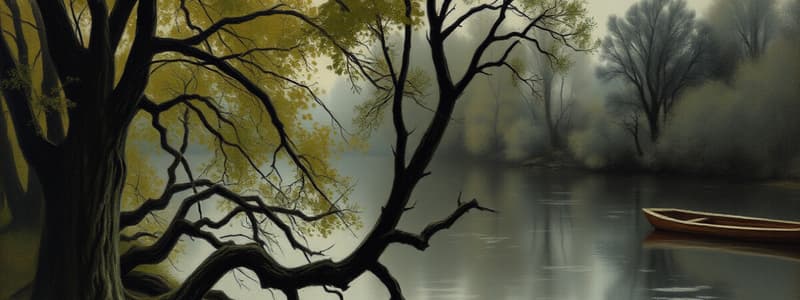Podcast
Questions and Answers
What is narrative poetry?
What is narrative poetry?
Tells a story.
What is a ballad?
What is a ballad?
- A short poem expressing personal thoughts.
- A type of poem that tells a story and is often sung. (correct)
- A playful form of poetry.
- A poem with no rhyme scheme.
What is blank verse?
What is blank verse?
A type of poetry with unrhymed lines and a regular beat.
What is an elegy?
What is an elegy?
What does an epic tell?
What does an epic tell?
What is free verse?
What is free verse?
What is a haiku?
What is a haiku?
What is light verse?
What is light verse?
What characterizes lyric poetry?
What characterizes lyric poetry?
What is the purpose of an ode?
What is the purpose of an ode?
What is prose poetry?
What is prose poetry?
What is a sonnet?
What is a sonnet?
What characterizes a limerick?
What characterizes a limerick?
What is a line in poetry?
What is a line in poetry?
What is a stanza?
What is a stanza?
What is rhyme?
What is rhyme?
What is rhythm in poetry?
What is rhythm in poetry?
Flashcards are hidden until you start studying
Study Notes
Types of Poetry
- Narrative Poetry: Tells a story, blending elements of both poetry and prose.
- Ballad: A traditional storytelling poem often sung or read aloud, crafted to convey tales of love, adventure, or tragedy.
- Blank Verse: Comprises unrhymed lines with a consistent rhythm or syllable pattern, commonly used in English dramatic and epic poetry.
- Elegy: A serious and sorrowful poem, typically mourning the death of a revered individual.
- Epic: A lengthy narrative poem that celebrates the deeds of legendary figures, often rooted in historical or cultural narratives.
- Free Verse: Lacks fixed patterns of rhythm or rhyme, allowing poets the freedom to express thoughts without structural constraints.
- Haiku: A three-line Japanese poem following a 5-7-5 syllable structure, reflecting on nature or the poet's emotions connected to it.
- Light Verse: Includes amusing, playful compositions such as limericks, often designed to entertain.
- Lyric Poetry: Short, musical poetry that conveys the poet's personal emotions and thoughts.
- Ode: A formal and often lengthy poem dedicated to praising a person, object, or event.
- Prose Poetry: Combines poetic features with prose format; lacks line breaks and traditional poetic structure.
- Sonnet: Comprises 14 lines, typically in iambic pentameter, often exploring themes of love with established rhyme schemes.
- Limerick: A five-line humorous poem characterized by a distinct rhythm and rhyme scheme.
- Line: A single row of words in a poem, serving as a fundamental unit of poetic structure.
- Stanza: A grouping of lines in a poem, functioning similarly to a paragraph in prose.
- Rhyme: The repetition of similar sounds at the end of words, creating a musical quality in poetry.
- Rhythm: The organized pattern of stressed and unstressed syllables, contributing to the flow and movement of poetry.
Studying That Suits You
Use AI to generate personalized quizzes and flashcards to suit your learning preferences.




